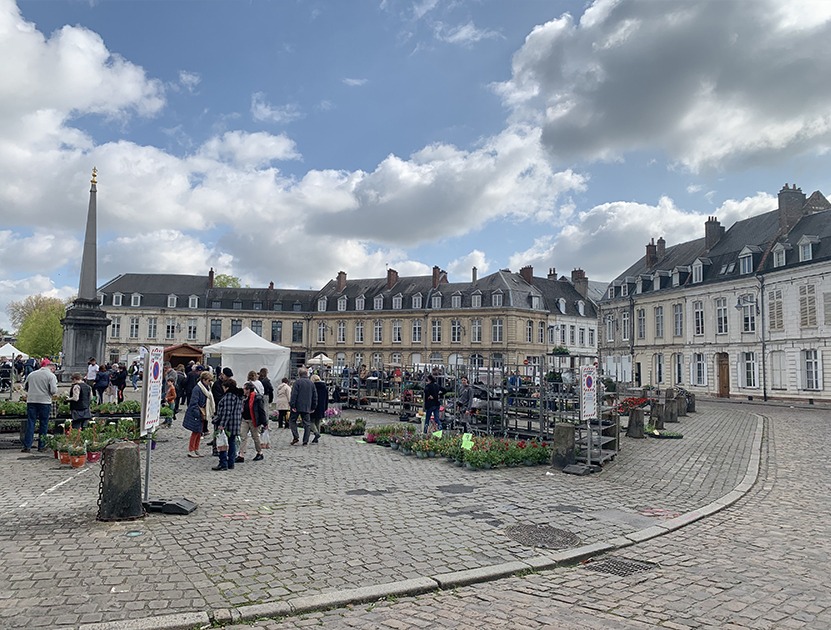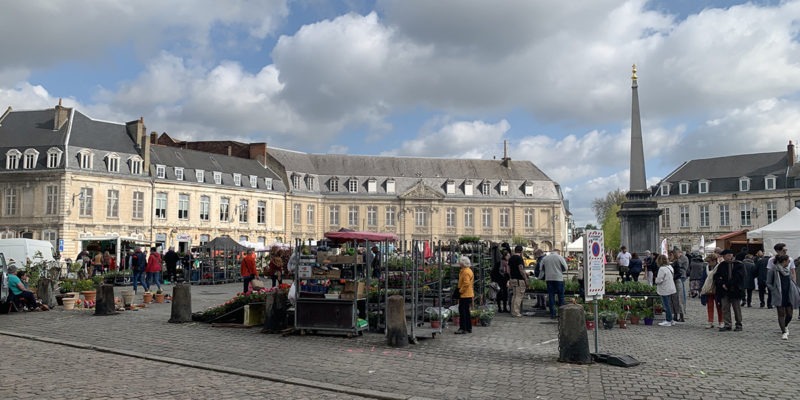As we all know, May 1st is a day of celebration in France, paying tribute to working men and women for their contribution to society. In Arras, we’re celebrating May 1st with two major events: the Salon du Livre and the annual flower market on Place Victor Hugo in Arras. Zoom in on the latter!
Flowers for every taste
If you’re looking for something to do on May 1st, why not visit the flower market organized by the Victor Hugo district association in Arras (Pas-de-Calais) ? In 2023, the 31st edition took place on the eponymous square from 9 a.m. to 6 p.m., where 24 craftsmen and merchants offered a wide variety of plants and flowers for the garden and home.
Special nature events
To liven up the market, the Centre Permanent d’Initiatives pour l’Environnement des Villes de l’Artois (permanent center for environmental initiatives in Artois towns) is offering events for all ages, while the Syndicat Mixte Artois Valorisation is presenting a stand on composting and outlets for green waste, as Arras Pays d’Artois explains on its official website. In addition, the Arras brass band will be marching through the square, before moving on to the bandstand in the Governor’s garden.
A convivial moment for the people of Arras
But the flower market isn’t just an opportunity to buy plants. It’s also a chance to spend some quality time with family and friends, strolling between the stalls, chatting to the growers and discovering new varieties of flowers. Children can take part in fun activities involving flowers and plants, while adults can enjoy the many food and drink stalls. 
How old is the Arras flower market?
The flower market, a must-attend annual event for nature lovers and gardening enthusiasts, has been organized since 2018 by the local Victor-Hugo neighborhood association, in partnership with the City. This close collaboration between the association and local authorities has made the event a success every year, with more and more visitors coming from all corners of Artois to discover the latest trends in plants and flowers. The Victor-Hugo district association is heavily involved in the organization of this event, which has become a veritable floral tradition for the city of Arras. It works closely with local growers to offer visitors a wide selection of plants, flowers and shrubs, as well as expert advice to help them choose the varieties best suited to their gardens. For its part, the City of Arras provides logistical support for the organization of the event, making available the equipment needed to set up stands and stalls, as well as ensuring safety and traffic management on Place Victor-Hugo for the duration of the event.
This close collaboration between the local association of the Victor-Hugo district and the City of Arras has enabled the flower market to become a renowned event, attracting large numbers of visitors every year to discover the latest trends in plants and flowers, and to spend a pleasant moment with family and friends. All in all, the flower market has become a true symbol of the cooperation between local players to promote the region’s riches and offer visitors a memorable experience.

The sumptuous setting of Place Victor Hugo
The origins of flower markets in France: The Paris market
The origins of the Marché aux fleurs, now a key event in Parisian life, date back to the time of Napoleon. In 1808, the Emperor signed a decree stating that the flower market on the Quai de la Mégisserie was to be moved between Notre-Dame de Paris and the Sainte Chapelle, with the aim of facilitating the city’s flower supply and promoting floral art. The new flower market was inaugurated in August 1809, with a dozen small stalls. At the time, flowers were considered a luxury reserved for a wealthy elite, but the Place Louis Lépine flower market made them more accessible to the general public. Over the years, the Place Louis Lépine flower market has grown to become one of the most important flower and plant markets in Paris. It has become a must-see tourist attraction, attracting visitors from all over the world who come to admire the magnificent floral arrangements displayed on the stalls.
R.C.
